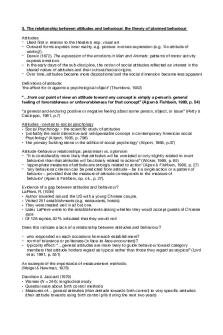Q1 Explain the relationship between resilience and mental wellbeing PDF

| Title | Q1 Explain the relationship between resilience and mental wellbeing |
|---|---|
| Author | Faye Taylor |
| Course | Unit 4: Health and Wellbeing |
| Institution | Learndirect |
| Pages | 2 |
| File Size | 79.5 KB |
| File Type | |
| Total Downloads | 10 |
| Total Views | 195 |
Summary
This unit is ungraded but will be awarded upon successful achievement of all assessment criteria and learning outcomes. Graded "achieved"....
Description
The Relationship Between Resilience and Mental Wellbeing
Resilience is the way in which we deal with changes and situations around us that may be challenging. Individuals who demonstrate resilience are more likely to cope within new or stressful environments. This ability to cope, means they generally have a better mental wellbeing. Mental wellbeing means having a positive outlook, self-esteem, and able to express emotions. People who demonstrate resilience can develop coping mechanisms which allows them to take control within otherwise stressful situations. They’re able to think rationally, constructively, and develop strategies that enable them to stay calm in a crisis. They can set and achieve goals which creates a positive mental state.
Being resilient can be a vital life skill and there are various strategies that can be used to develop it.
Diet - Self-care is key, so it’s important to eat healthily and take regular exercise. An unhealthy diet could lead to weight gain which could lower a person’s self-esteem. Eating sugar, and processed foods, can cause a sugar rush followed by an energy crash, whereas a healthy diet enables healthier bodily functions [ CITATION Lea21 \l 2057 ]. Exercise - When we exercise, our bodies release a variety of chemicals (neurotransmitters) such as endorphins, which help regulate our mood and relieve stress. Another chemical is serotonin which helps improve sleep and appetite [ CITATION Col17 \l 2057 ]. Sleep - Another key strategy is sleep hygiene. It’s important that we get enough quality sleep each evening. A relaxing bedtime routine should contribute towards a good night’s sleep. This could include meditation or a bath, and minimal mental stimulation (electronic devices). Talking - Communicating and sharing your thoughts and feelings is an essential way of building resilience. Studies have shown that having social support, be it friends, family, colleagues, or professional help, enables good psychological health [ CITATION Ozb07 \l 2057 ]. Relaxation – It’s important to make time for yourself and relax. This could be as simple as a break from social media, taking a bath, listening to some music, or reading a book. Being creative (painting, colouring, knitting, etc) can also be relaxing as well as a way of expressing emotions. It gives your mind and body the opportunity to have a break from the stresses of everyday life and refocus. Organisation – Living and working in a clutter free, organised environment can help with focus and reduction in stress. Studies have shown that women who described their homes as incomplete or cluttered, had higher levels of cortisol (stress hormone) than those who were more positive about their surroundings [ CITATION Web20 \l 2057 ].
“Mens sana in corpore sano” Latin tag from the Satires of Juvenal (adc. 60–c. 130) meaning ‘a rational mind in a healthy body’ [ CITATION Oxf21 \l 2057 ]
References Collins, R., 2017. Exercise, Depression, and the Brain. [Online] Available at: https://www.healthline.com/health/depression/exercise [Accessed 08 December 2021]. Learndirect, 2021. Common strategies that can be used to build resilience. [Online] Available at: https://ldatom.epearl.co.uk//vle/_store/scorm/1634116997-health-and-wellbeingscorm2004-2-telmlhwh/scormcontent/index.html#/lessons/6d3wykpl4eyf221VWTYdPZSPa9UXWVFY [Accessed 08 December 2021]. Oxford University Press, 2021. The Oxford Dictionary of Phrase and Fable (2ed.). [Online] Available at: https://www.oxfordreference.com/view/10.1093/acref/9780198609810.001.0001/acref9780198609810-e-4491 [Accessed 10 December 2021]. Ozbay, F. et al., 2007. Social Support and Resilience to Stress. [Online] Available at: https://www.ncbi.nlm.nih.gov/pmc/articles/PMC2921311/#B47 [Accessed 08 December 2021]. WebMD, LLC., 2020. Mental Health Benefits of Decluttering. [Online] Available at: https://www.webmd.com/mental-health/mental-health-benefits-of-decluttering [Accessed 12 December 2021]....
Similar Free PDFs
Popular Institutions
- Tinajero National High School - Annex
- Politeknik Caltex Riau
- Yokohama City University
- SGT University
- University of Al-Qadisiyah
- Divine Word College of Vigan
- Techniek College Rotterdam
- Universidade de Santiago
- Universiti Teknologi MARA Cawangan Johor Kampus Pasir Gudang
- Poltekkes Kemenkes Yogyakarta
- Baguio City National High School
- Colegio san marcos
- preparatoria uno
- Centro de Bachillerato Tecnológico Industrial y de Servicios No. 107
- Dalian Maritime University
- Quang Trung Secondary School
- Colegio Tecnológico en Informática
- Corporación Regional de Educación Superior
- Grupo CEDVA
- Dar Al Uloom University
- Centro de Estudios Preuniversitarios de la Universidad Nacional de Ingeniería
- 上智大学
- Aakash International School, Nuna Majara
- San Felipe Neri Catholic School
- Kang Chiao International School - New Taipei City
- Misamis Occidental National High School
- Institución Educativa Escuela Normal Juan Ladrilleros
- Kolehiyo ng Pantukan
- Batanes State College
- Instituto Continental
- Sekolah Menengah Kejuruan Kesehatan Kaltara (Tarakan)
- Colegio de La Inmaculada Concepcion - Cebu















